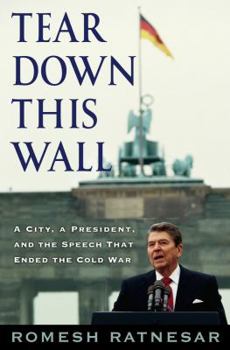Tear Down This Wall: A City, a President, and the Speech That Ended the Cold War
Select Format
Select Condition 
Book Overview
Focusing on the "Tear Down this Wall "speech," " this is a fresh interpretation of of President Reagan's evolving attitude toward the Soviet Union.
Format:Hardcover
Language:English
ISBN:1416556907
ISBN13:9781416556909
Release Date:November 2009
Publisher:Simon & Schuster
Length:229 Pages
Weight:1.00 lbs.
Dimensions:0.9" x 6.4" x 9.6"
Customer Reviews
5 ratings
for the book Tear Down This Wall
Published by Thriftbooks.com User , 14 years ago
an easy and entertaining history with lots of trivia about the tearing down of the Berlin Wall. Reagan was just one of the players.It is not a book about Reagan.
Excellent handling
Published by Thriftbooks.com User , 15 years ago
This is an excellent non-partisan handling of one of America's greatest orators. Whether you agree with Reagan's politics, you have to love his leadership. Mr. Ratnesar does a great job of presenting the many faces behind that momentous time in American History. The tension and friendship between Ronald Reagan and Michael Gorbechav, was fascinating and the author does a superb job breaking down that unique relationship, keeping it interesting while informative. This book is a good piece that belongs with the rest of Reagan histories.
The World Turned Upside Down
Published by Thriftbooks.com User , 15 years ago
President Reagan's speech at Berlin's 750th anniversary was more than a challenge to Chairman Gorbachev. In many ways, the speech was a triumph of will, a sharp coda to a fundamental change in the Western World, marking the end of empires along with new possibilities. The speech did not happen in a vacuum. Reagan's strong views on The Wall were well formed and well known long before he became president. They were also held by many others as well, but certainly not all. This book is more then a retelling of the speech, but a narrative of how it came about, with a quick pace that is very much like a cliff hanging adventure story. All governments are reactionary, resistant to changes of any kind that they cannot directly and absolutely control. Those in the US bureaucracy opposing the challenge, even the speech's tone, differed from their European and Soviet counterparts only in their creative justifications for, in effect, not rocking the boat. When it became clear that the speech was a defining moment in the Cold War, did those who opposed it most claimed credit for their bold words and visions of possibilities. The narrative goes beyond Washington's turf battles, looking as well at the context, through European and Soviet eyes. Some two years later, The Wall came down. It would have happened sooner or later; Berlin, after all, had seen a lot during its 750 years. Reagen's speech helped the process along, more by looking to the future of possibilities rather than the rigidities of the past. The book's 219 pages are organized into ten chapters, with an epilogue, well researched, and includes the speech's text. It also has a nice `where are they now?' section, contrasting their lives' now with what they were then when they were witnesses to the speech. Very readable, and highly recommended.
Brilliant!
Published by Thriftbooks.com User , 15 years ago
Really enjoyed reading this book. I am by no means an academic or historian, yet I found it riveting. I was 11 years old when the wall fell and Tear Down This Wall put me back in the cold war frame of mind that we often forget. The book is well researched and provides an interesting perspective on the end of the cold war and the events leading up to it. It even included recently declassified state department documents which is just cool. All this packed into 200 concise pages. Timing of the book is also great with the 20th anniversary around the corner.
As good at the speech itself
Published by Thriftbooks.com User , 15 years ago
I don't usually like these kinds of history books as much as my Dad, partly because I've spent my life hearing about each Presidential bio he's read, but I was totally into Romesh Ratnesar's account of a far more complicated time than it looked like when I was living through it. He uses the most important moment of Reagan's presidentcy to explain not just the man, but the world in the 1980s. It's a portrait of Reagan that surprises - he's both more out of it and more brilliant, more oblivious to details and more unilateral in his decision making process than I expected. If you've ever read Romesh's stuff in Time you know that he is a spare, honest, thoughtful deliverer of prose in an era where everyone else is trying too hard to get your attention. Like I am right here. And not to ruin anything, but at the end, the wall does come down.





